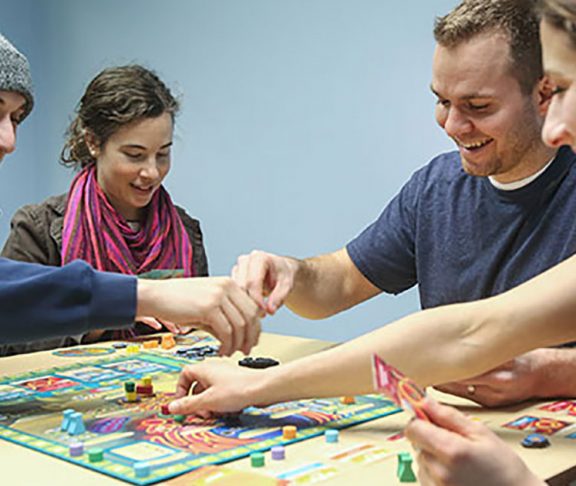A STEM-based publishing company has found a playful way to make learning about challenging topics more engaging.
Genius Games founder and CEO John Coveyou still remembers the first game he created as a child.
“I was eight or nine, and it was made essentially out of notes and sketches on graph paper, and was set in a sci-fi world,” explains the former teacher and engineer. “I convinced a bunch of my neighborhood friends to play it. Not surprisingly, that game was terrible, but it was a great experience for me.”
In 2013, Coveyou started his own company to make intimidating concepts more relatable.
“So many students come to the study of science with a lot of negative baggage. They’ve already decided it’s too hard for them, too geeky for them, too boring, so unless someone addresses these underlying influences, students do not find it fun.”
Imagining the possibilities
In creating a game, Coveyou begins with a concept that’s foundational to biology, chemistry or physics, and also fascinating to him.
“At the heart of each game is a particular science concept, with a fairly different type of gameplay featured. For example, ‘Cytosis: A Cell Biology Game’ takes place entirely inside a human cell. To win, you have to accomplish what a living cell has to accomplish in real life.”
Instead of spending hours reading textbooks or memorizing flashcards, students can be inspired through play, and experience the delight in discovery.
“As a rule, kids have an intense, innate drive to explore the world around them. I think, as teachers, we want to work with that drive, harnessing curiosity as much as possible.”
Seeing is believing
Jason Bodnar, a high school chemistry teacher in Waterloo, IN, knows first-hand the value of incorporating games into lesson plans.
“I’ve used Ion to help reinforce ionic compound formation and naming, and Covalence to help students become more familiar with molecules. My AP chemistry students have specifically enjoyed playing Subatomic. Students of all ages enjoy playing games a lot more than just listening to a teacher lecture.”
Coveyou started Genius Games because he believes integrating STEM into games and education is essential in battling stigmas and parental pressures that often leave students feeling incapable, or overwhelmed to the point of walking away.
“Scientific inquiry and innovation isn’t just going to happen if the next generation of kids thinks and feels this way about science. The urgency to demystify science and make it fun and approachable is at the heart of what I do.”


